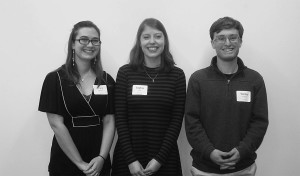Three Houghton College seniors presented independent research at the annual Penn-York conference last Saturday, accompanied by professor of English and writing, Laurie Dashnau.

The group travelled to St. Bonaventure University to participate with other undergraduate researchers from New York and Pennsylvania colleges. Grace MacKay presented research in psychology, Sophia Ross presented her study of American poet Elizabeth Bishop, and Wesley Payette gave a poster presentation on marine biology.
Professors “highly encourage” students to participate in the conference, said Dashnau. “Houghton has regularly participated in this conference since 2005….[Houghton’s and Dashnau’s participation] grew out of my passion for mentoring,” she said.
At this “less formal” interdisciplinary conference, Dashnau said presenters often receive feedback on their research from professors, which can be “especially helpful” for students whose research is still in progress. The five minute question and answer period after presentations “often continue into the hallway and lunch hour,” she said.
Payette’s poster presentation was titled, “The effects of ocean acidification on copepod physiological ecology.” In layman’s terms, the biology major said, “It’s just a small part of the marine food chain I was studying.” Payette said his research yielded findings “that tie in directly to climate change.”
“Copepods, which are an important part of the marine food chain, they prey on a lot of phytoplankton. When they are exposed to higher levels of CO2, they tend to eat less.” This could have major effects on marine ecosystems, he said. “If we can understand how plankton and their predators behave, we can predict how plankton will affect the ecosystem.” Payette’s research came about through a marine biology internship he participated in last summer, “a one time thing”, he said. “I’m going to try to go into biomedical research or disease ecology” in graduate school after taking a gap year, he said.
Psychology and writing major Grace MacKay presented on “The Effects of Life Orientation and Message Framing on Decision Making”.
“I haven’t done the study yet,” she said. The project is part of her honors thesis, and she plans to conduct experiments through the next several months. She will also present her research “several times in the spring”. She said psychology professor Paul Young encouraged her “to get some experience” delivering the topic to audiences at the Penn-York Conference.
MacKay said people “respond to the way a situation is described to us,” depending on whether a situation is described in terms of risk or reward. Life orientation, or optimism and pessimism,and message framing, “the wording of a situation” influences how individuals make decisions, she said.
“A pessimist tends to be more negative in general, a negative message framing tends to reinforce their natural inclination to think in terms of losses,” MacKay said.
This research can be applied to help people make decisions “by understanding how people work” and calculate risk, MacKay noted. “This can be applied to health, investments, things like that,” she said.
English major Sophia Ross presented on the contemporary poet Elizabeth Bishop. Titled “Remembering Mother and Motherland: The Experience of Loss in Elizabeth Bishop’s Nova Scotia Prose and Poetry,” Ross’s work explored Bishop’s experience as a Canadian American. Though Bishop was born and raised in Canada before moving to New England. Ross said “She really is considered an American Poet. She won the Pulitzer Prize, the National Book Award, she was the US Poet Laureate. But if you read her letters, she says she is half Canadian and half American. In a letter to her biographer, she said she considered herself three quarters Canadian and one quarter New Englander.”
Ross said much of the research done on Bishop revolves around her [Bishop’s] years in Brazil, her relationship with Robert Lowell, and that Bishop was a lesbian. “I wanted to see how Nova Scotia played into her work and write something that really brought that forward…these [other subjects] are interesting and definitely matter, but there’s not a lot done about Nova Scotia and how that affected her work,” Ross said.
“It was good,” MacKay said. “It was a good experience- there was a broad range of research. It was cool to interact with other students in the same boat.” While Payette and Ross have closed the book on their topics for the time being, MacKay is still in the midst of her work, now gathering “as many [experiment participants] as [she] can get”.

2 replies on “Seniors Present Research At Penn-York Conference”
[…] Read the full article from the Source… […]
[…] Read the full article from the Source… […]